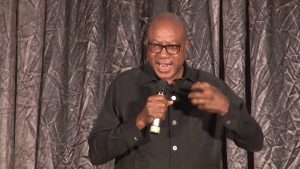CurrentReport Blog Elder statesman Dr. Chike Obidigbo has criticized the Economic and Financial Crimes Commission (EFCC) for its continued prosecution of former state governors after their tenure, describing it as unconstitutional.

In a statement issued on Thursday, Obidigbo expressed concern that the anti-graft agency has become a tool for desperate politicians and business figures seeking to settle personal scores. He questioned the legal basis for the EFCC’s post-tenure trials, arguing that the Nigerian Constitution does not support such actions.
EFCC’s Court Losses Raise Concerns
Dr. Obidigbo highlighted the EFCC’s frequent losses in court cases, stating that this trend suggests serious flaws in the agency’s operations.
“For the EFCC to keep losing many court cases shows that all is not well with the commission’s standard operating mechanism,” he asserted.
The anti-corruption agency has made it a routine to go after former governors immediately after they leave office. Many ex-governors are currently facing EFCC scrutiny for alleged corruption.
Notable recent cases include former Anambra State Governor Willie Obiano and ex-Kogi State Governor Yahaya Bello, both of whom have had legal battles with the EFCC.
Post-Tenure Trials Violate the Constitution
Obidigbo argued that subjecting governors to EFCC trials after their tenure contradicts the provisions of the Nigerian Constitution. He pointed out that while the constitution grants immunity to sitting governors, it does not explicitly empower an external agency to investigate them after they leave office.
He insisted that state Houses of Assembly, as elected representatives of the people, should have the primary responsibility for overseeing governors’ actions.
“A lot of things are going topsy-turvy in this country. The harassment of state governors after their tour of duty is in total violation of constitutional provisions,” he said.
“In the presidential democracy which we pretend to practise, the legislature is the main organ of oversight on the activities of the executive.”
Security Votes and EFCC’s Overreach
Obidigbo also questioned the EFCC’s probe into governors’ use of security votes, which he described as a “blind budget” authorized by the constitution.
“Security votes have been rendered opaque by the constitution, which categorises them as funds in a blind budget. So, if the constitution empowers state governors to implement the blind budget as they deem fit, the EFCC should have no business searching for departed sums,” he stated.
He further argued that it is unjust for former governors to be investigated without the involvement of their home states, calling it a violation of democratic principles.
Double Standards in EFCC Investigations
The elder statesman questioned why former presidents, who enjoy the same constitutional immunity as state governors, are not subjected to similar investigations.
He called on the National Assembly to step in and prevent the EFCC from becoming a threat to Nigeria’s democracy.
Rather than acting as a deterrent to corruption, Obidigbo claimed that the EFCC’s probes often encourage corruption, as operatives exploit cases to extort and blackmail suspects.
With growing concerns over selective prosecution and political interference, he urged the government to redefine the EFCC’s role to ensure fairness, transparency, and respect for constitutional boundaries.












